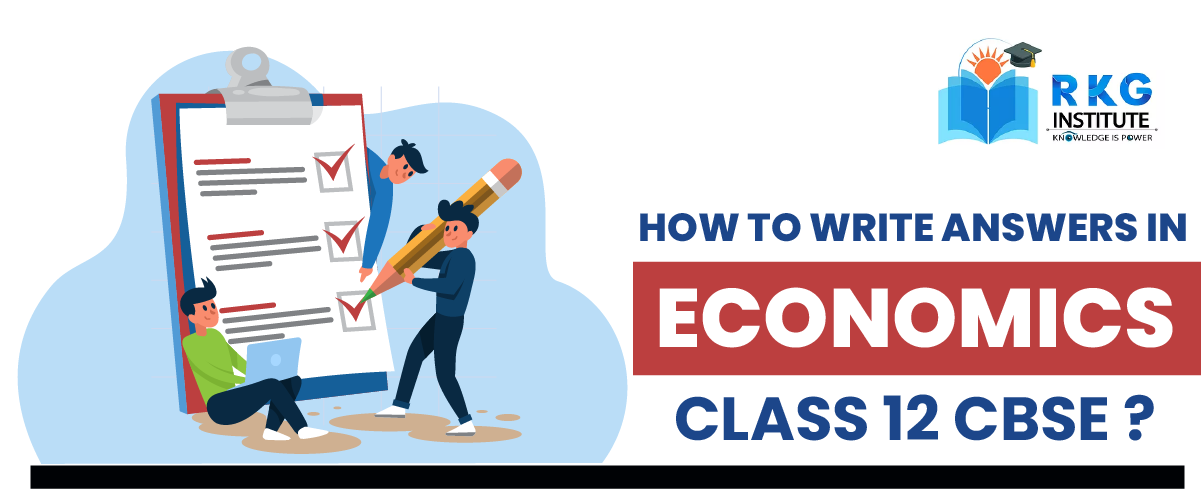Economics in class 12th is a major subject for students of commerce and arts. The subject deals with two crucial aspects – introductory macroeconomics and Indian Economic Development, which makes it very practical as well as theoretical at the same time. This requirement of diversity in approaches to study and write answers is one of the major reasons why students face challenges in scoring good marks in class 12th economics.
This article will guide you through some tips on how to write perfect answers for macroeconomics and IED separately in CBSE class 12th economics board exam, considering that you already are well versed with the strategy to score good marks in economics. Read out the following article by RKG Institute.
ANSWER WRITING FOR INTRODUCTORY MACROECONOMICS
As already stated earlier, macroeconomics is more practical and deals with numericals, graphs and analytical understanding of various economic variables. Therefore, when a candidate writes an answer for macroeconomics, he/she needs to keep in mind the nature and demand of macroeconomics.
- Use graphs wherever possible
No matter how short or long the answer is, if there’s a scope of making your answer much more interactive and depicting your knowledge through a graph, seize it. Graphs communicate the deepness of your understanding of the matter in hand to the examiner, thus fetching more marks.
Never fail to draw graphs and schedules for questions on topics like aggregate demand and supply, foreign exchange rate, etc.

- 2. Don’t write paragraphs
Don’t just fill your sheets. It won’t help. In practical subjects like macroeconomics, it is very important to write an organised answer, instead of a monotonous one. The examiner must not find it difficult to find and understand the answer that you have written.
- Use bullet points, flowcharts and examples to make your answer organised in a good manner. Make your answer approachable.
- Proper labelling of the graphs and proper explanation of the abbreviations and symbols used is very necessary.

- 3. Use economic terms
There are certain questions that require you to write definitions or explain a concept. While explaining a term in your own language is definitely very impressive and marks fetching, it is important that you don’t forget to use some economic terms that are used in books. For example, the definition of Cash reserve Ratio, Government Budget, etc must be written in an economic tone, using the economic terms as it is in bookish language.
Definition that would fetch more marks: Cash reserve ratio is the share of a bank’s total deposit that is mandated by the central bank of a country to be maintained with the latter as reserves in the form of liquid cash.
Definition that won’t fetch much marks: Cash reserve ratio is the total amount of money that a bank keeps with the central bank.
Thereafter, you must explain the concept in your own language or through your own examples.

ANSWER WRITING FOR INDIAN ECONOMIC DEVELOPMENT
This part of class 12th economics is considered difficult by most of the students as it is completely theoretical. It is very easy to understand but a bit challenging to score, as the demands of good writing skills is higher here than macroeconomics.
- Mind the word limit
While writing answers for theoretical subjects, always pay attention and stick to the word limit. One of the major reasons of why students don’t score well in this paper is that they don’t comply with the word limits. If a question carries 5 marks, you cannot expect the examiner to give 5/5 if you have written an answer merely of 5 lines.
- Always look for word limits mentioned for each question. If there’s no such mention, comply with the following standard word limits followed in class 12th boards:
1/2 marks = 30-40 words
3 marks = 70-80 words
5 marks = 80-120 words
- Students have a myth among themselves: write 5 bullet points for 5 marks and 3 points for 3 marks. This is a very wrong conception of answer writing. The number of bullet points you write doesn’t have much impact on your marks. Your piece should be well answered covering all the aspects of the question, and must comply with the word limits.

- 2. Have an introduction and a conclusion
This only applies for questions for which you need to write more than 50-60 words. Your answer must contain a very short introduction about the topic, and a very short but comprehensive conclusion. This must not exceed 20-25 words.
An introduction and conclusion makes your stand and views clear and concrete, providing a good basis for the examiner to judge your answer.
- 3. Underline keywords
Often, answers of theoretical subjects are much elaborated. There are certain keywords, phrases, or quotes that have the power to convey the whole essence of your answer to the examiner. It would be much easier for the examiner to check and judge your answer if you are able to highlight those keywords/phrases/sentences in your answer by underlining them.
- 4. Have a clear handwriting
Good handwriting won’t fetch you extra marks, clear handwriting may. Make sure that you don’t cut much words and sentences in an unclear manner. Make sure that your answer sheet doesn’t look untidy and unappealing. Have proper gaps between words and paragraphs.
It is highly advisable that you go through the answer sheets of CBSE class 12th economics toppers of previous years, to get richer insights on answer writing in economics. For general understanding of paper presentation in board exams, read out the following article by RKG Institute:


